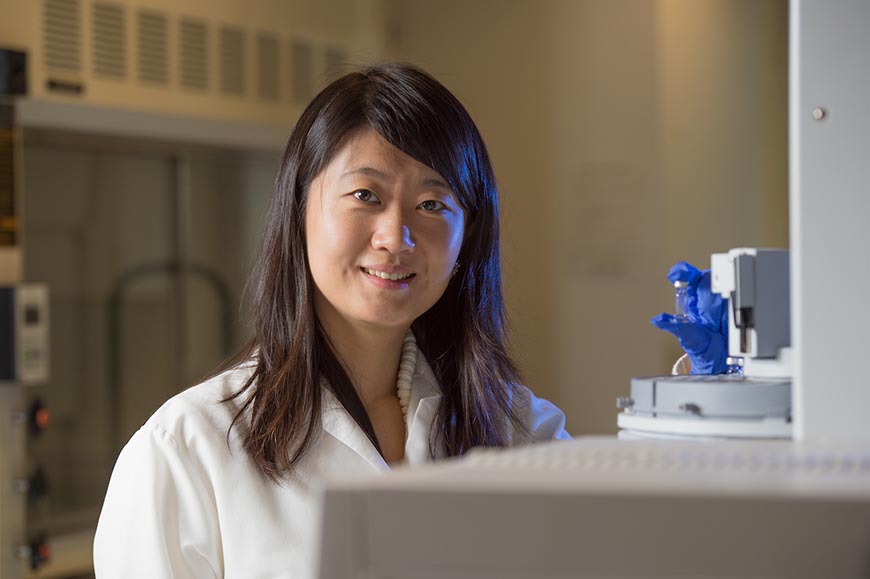Prestigious NSF CAREER Grant Awarded to College’s First Female Recipient

Dr. Wenqing Xu
Officially, Dr. Wenqing Xu began her research into pyrogenic carbonaceous matter (solid-residues from incomplete combustion, such as soot and charcoal) as a Chemical and Environmental Engineering doctoral student at Yale University. In reality, however, the seed was planted more than 20 years ago during her childhood in an undeveloped region of northwestern China. “We wore face masks to school and by the end of the day they were black,” she explains. That experience, and her family’s limited access to running water, sparked Dr. Xu’s interest in environmental issues, which ultimately led to her career in environmental engineering. Today, that passion for the environment has been rewarded with the National Science Foundation’s coveted CAREER grant for her work “Transforming the Synergistic Interactions between Pyrogenic Carbonaceous Matter (PCM) and Sulfur Species into Solutions for Contaminant Detoxification.”
A Villanova University Assistant Professor of Civil and Environmental Engineering since 2014, Dr. Xu’s work will be used to develop engineering solutions that will effectively destroy contaminants. In a recent study, Dr. Xu demonstrated that PCM and sulfide, which are naturally occurring, promote the degradation of toxic pollutants (e.g., DDT). However, due to the complexity that arises from the heterogeneity of the PCM system in the environment, the required conditions for detoxification are not understood. With the support of her CAREER grant, Dr. Xu will define the required environmental conditions and identify the PCM properties that are responsible for its reactivity. She says, “This project will allow for the discovery of a novel reaction pathway that can be harnessed to detoxify pollutants. Moreover, the knowledge generated from this project will enable a new generation of carbon-based materials that can be tailored to achieve simultaneous sorption and destruction of pollutants, ultimately revolutionizing the current practice for contaminant cleanup.” In conjunction with her research initiative through this grant, Dr. Xu will develop an educational outreach program targeted at underserved high-school students from inner city Philadelphia. She describes the objective, “By using 3-D virtual reality modules and hands-on lab experiences, we can better engage students with diverse learning styles to understand how pollutants enter the environment and how natural processes can promote their break down.”
Villanova Engineering students will also benefit from Dr. Xu’s research. In the four years she’s been with the College she has worked with eight undergraduates, including mentoring two Villanova Undergraduate Research Fellows. One of them, Jingxian “Cecily” Wang ’17, worked with Dr. Xu for two years and is now at Stanford University pursuing a graduate degree in Environmental Engineering. Graduating senior Cory Byrnes published a paper based on research he conducted with his professor and mentor. “I’m very proud of them,” she says, adding, “Villanova students are motivated, energetic and intelligent.”
Currently, Dr. Xu is working with two master’s students and two PhD candidates. One of her doctoral students is trained in polymer chemistry and the other in biology. Both have contributed significantly to Dr. Xu’s research. She notes, “It is so helpful to consider advances in other fields and disciplines and bring those together with what we’re doing in engineering.” With the support of the NSF CAREER grant, Dr. Xu plans to further increase both the number of undergraduate and graduate students who will actively conduct cutting edge research in her lab.
In addition to the NSF CAREER grant, Dr. Xu is engaged in a project for the Environmental Protection Agency. "Reactive Electrochemical Membranes for Simultaneous Removal of Multiple Classes of Contaminants of Concern in Small Drinking Water Systems" is a collaborative effort between Villanova University and the University of Illinois at Chicago. She is also leading an on-going project funded by the National Science Foundation of China to understand the interaction between PCM and sulfate-reducing bacteria in the environment.
Dr. Xu is the first woman in the College of Engineering to be awarded the CAREER grant, which provides $500,000 in support over five years. The College’s first recipient was Dr. Jacob Elmer, assistant professor of Chemical Engineering, who won the award in 2017 for “Manipulating the Innate Immune Response to Improve Gene Therapy.” The CAREER grant is the NSF’s most prestigious award in support of the early career-development activities of those teacher-scholars who most effectively integrate research and education within the context of the mission of their organization. Such activities are expected to build a firm foundation for a lifetime of integrated contributions to research and education.
